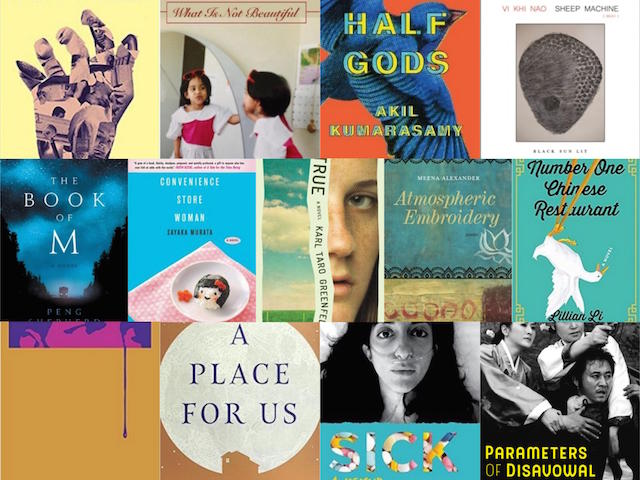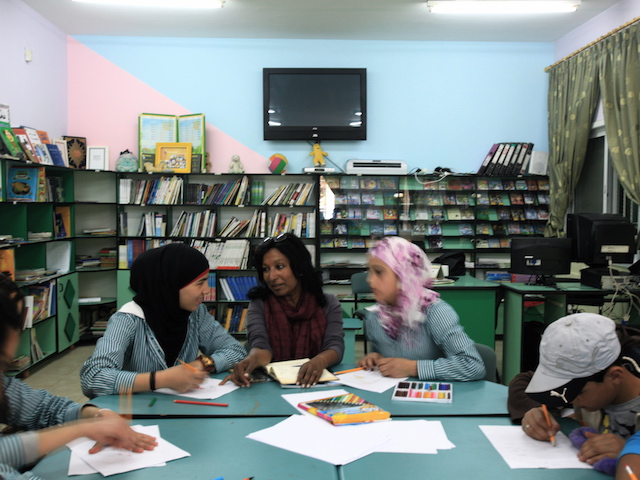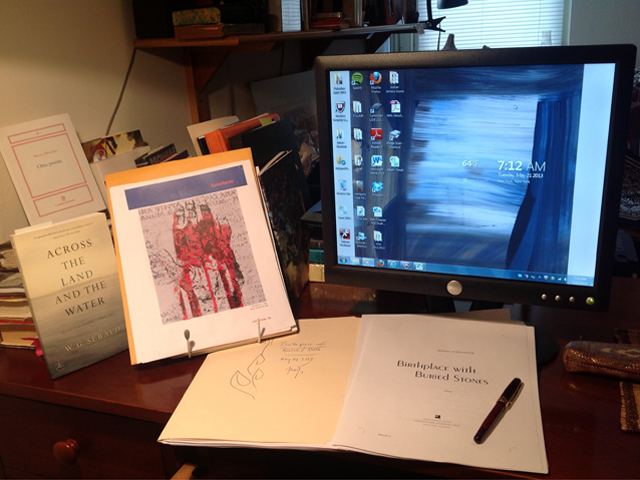As I looked at her notes from my papers in her class and her emails to me, I realized she had so much belief in my work. She was a teacher who had so much belief in her students.

May 8, 2019
The following is part of a series of essays and reflections published on The Margins in remembrance of the life and work of poet and scholar Meena Alexander, who passed away on November 21, 2018.
Meena Alexander had more poems to recite, students to teach, jokes to tell, cities to visit, writers to mentor, books to write, movements to inspire, and babies to hold. Meena was a true elder who championed us baby writers/activists/writers at SAWCC in 1997. We shared a love of art viewing, and often saw each other at exhibition openings. We shared a love for Zarina Hashmi’s work and toasted Zarina at her Guggenheim solo exhibition, and Meena’s poetry was painted onto a wall at the Smithsonian Institution, where I had some art showing as part of the “Beyond Bollywood” exhibition. I loved her elegance, humor, wit, and profound sense of justice. The last time I saw her was last February at NYU Global conference when I spoke on MeToo with this generation’s feminists, and Meena was taking notes, engaging with all of us, always learning and thinking. I wish I had taken a picture of us, and that we had spent more time together.
As I looked at her notes from my papers in her class and her emails to me, I realized she had so much belief in my work. She was a teacher who had so much belief in her students. She was also a steadfast advocate of CUNY, one of the most robust and civic public institutions of higher learning in the United States, where more than half the students have family incomes below $30,000. She co-wrote an op-ed that advocated both for students—”the tuition hikes have increased the proportion of CUNY’s budget paid by students at the same time that New York’s wealthiest residents have enjoyed tax cuts”—and for contingent faculty: “half of CUNY’s courses are taught by adjuncts, whose low pay and meager benefits shame a state that stands for fair labor practices and disadvantage students who need more full-time faculty for advising, career guidance and research supervision.” She was a poet who could write about tax codes, a highly-ranked tenured professor who wrote directly to the governor on behalf of adjuncts.
I was so lucky to take a class with her on Partition and caste in 2014 at the CUNY Grad Center and I learned so much. When I mentioned the research on my grandmother’s life that I was doing for my novel that is set during Partition, Meena asked me about my grandmother’s letters and diaries. I told her I was not sure if she had a diary, but I would ask her. Meena was confused, and I told her that my grandmother was alive, and I was seeing her this weekend, so I will ask her in person. Meena shrieked in joy, that my grandmother’s stories were so accessible. Four years later, my grandmother died a week before Meena did. As I wrote my grandmother’s obituary and tried to weave in poetry, history and memory, I thought of Meena often. Meena died the day after I emailed her my grandmother’s obituary. I assumed I would see her at her Atmospheric Embroidery book launch, to which I had just sent my RSVP.
One of my fondest memories of Meena was when I went to pick up my final paper in her class. I had no sitter so I brought my three-year-old to office hours (first and only time) and Meena was truly delighted! I thought maybe she was being polite, or she could see how stressed I was that I did not have childcare. Alas, it was actual joy. Meena found crayons and paper, and she read us a poem she had just written that morning. Who else does office hours like that?



